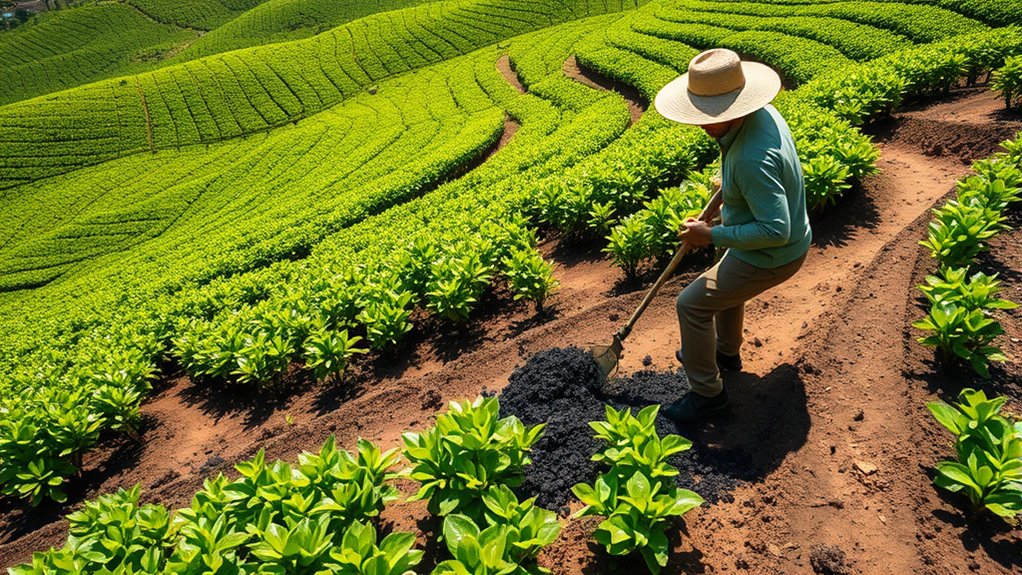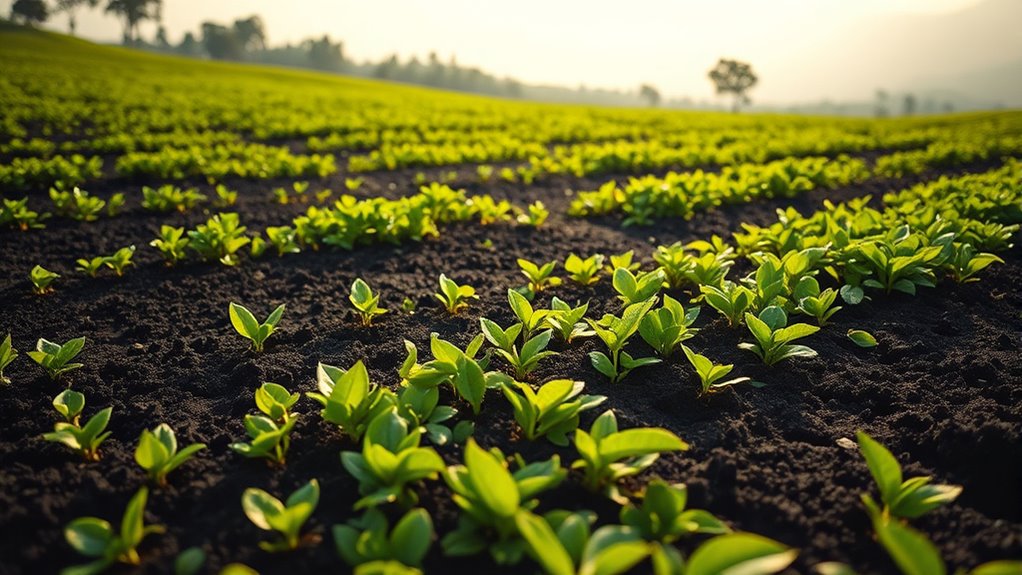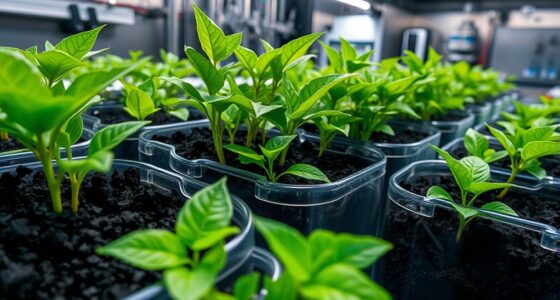Adding biochar to your tea fields can markedly boost soil health and crop yields. It improves water retention, aeration, and microbial activity while reducing soil acidity. These benefits promote healthier plants, better nutrient availability, and more consistent harvests. Plus, biochar helps protect your soil from erosion and environmental stresses. If you keep exploring, you’ll discover how this sustainable amendment can transform your tea cultivation practices for long-term success.
Key Takeaways
- Biochar improves soil fertility, water retention, and aeration, enhancing tea plant growth and yield sustainably.
- Incorporating biochar reduces fertilizer leaching and nutrient runoff, promoting environmentally friendly tea farming.
- Long-term biochar application strengthens soil resilience against droughts and heavy rainfall.
- Trials demonstrate increased tea quality and productivity with biochar as a soil amendment.
- Using biochar supports sustainable practices, reducing input costs and environmental impact in tea cultivation.

Have you ever considered how biochar can transform tea cultivation? This soil amendment has gained attention for its potential to improve soil health and boost crop yield, especially in regions where tea is a crucial economic crop. When you incorporate biochar into your tea fields, you’re adding a carbon-rich material derived from pyrolyzed organic matter. This process creates a porous substance that can substantially enhance the physical and chemical properties of your soil. By doing so, you create a more favorable environment for tea plant roots to grow and access nutrients effectively. Improved soil health means better water retention, increased aeration, and a reduction in soil acidity, all of which contribute to healthier plants and more consistent yields.
Using biochar in your tea fields can also lead to a notable increase in crop yield. The porous structure of biochar acts as a habitat for beneficial microorganisms that are essential for nutrient cycling. These microbes help decompose organic matter and release essential nutrients that your tea plants need to thrive. As a result, your soil becomes more fertile over time, reducing the need for chemical fertilizers and promoting sustainable farming practices. The ability of biochar to retain nutrients means that less fertilizer leaches away during heavy rains, ensuring your plants have access to nutrients longer and more efficiently. This not only improves crop yield but also minimizes environmental impact, making your tea cultivation more sustainable.
Biochar enhances soil fertility, microbial activity, and nutrient retention for sustainable, high-yield tea cultivation.
Furthermore, biochar’s capacity to improve soil resilience helps your tea plants withstand environmental stresses such as droughts or heavy rainfall. Its high surface area and porosity help retain moisture during dry spells, providing your plants with a steady water supply. During periods of excess rain, biochar helps prevent nutrient runoff and soil erosion, maintaining the integrity of your fields. Over time, these improvements contribute to more stable yields and healthier plants, which can translate into better quality tea leaves. The long-term benefits of biochar include reduced input costs, healthier soil ecosystems, and a more sustainable approach to tea farming. Additionally, incorporating biochar aligns with the principles of market research and sustainable practices that appeal to environmentally conscious consumers.
In essence, integrating biochar into your tea cultivation practices offers a promising way to enhance soil health and increase crop yield. By focusing on these core benefits, you can develop a more sustainable, productive tea farming system that benefits both your business and the environment. As research continues to evolve, adopting biochar could become a standard practice for forward-thinking tea growers aiming for resilient and high-yielding fields.
Frequently Asked Questions
How Does Biochar Affect Tea Leaf Flavor?
You might notice that biochar enhances tea leaf flavor by promoting flavor enhancement and aroma preservation. When added to soil, biochar improves nutrient retention, leading to healthier tea plants and richer flavors. Its porous structure helps retain aromatic compounds, ensuring a more vibrant aroma. As a result, your tea could taste more robust and aromatic, offering a better sensory experience. So, biochar’s role in soil health directly influences the flavor and aroma quality of your tea.
What Is the Cost Comparison Between Biochar and Traditional Fertilizers?
Imagine balancing a seesaw—cost analysis reveals biochar often costs more upfront than traditional fertilizers. However, you gain long-term economic benefits, like enhanced soil health and reduced input needs. While initial expenses may seem steep, the savings from increased yield and sustainability tip the scale in favor of biochar. So, you’re investing in a greener future, where economic benefits grow as soil quality flourishes over time.
Can Biochar Be Reused or Recycled After Application?
You might wonder if biochar can be reused or recycled after application. Biochar recycling is possible through reuse methods like blending it with compost or reapplying it to soil. It’s durable and stable, which means it retains benefits over time. While it doesn’t decompose easily, you can refresh its properties by mixing it with organic matter or using it as a soil amendment again, promoting sustainable practices.
How Long Does It Take to See Soil Improvement Effects?
You might find it surprising, but you often see soil improvements in just a few months. As biochar interacts with soil, you notice changes in soil nutrient dynamics and microbial activity. These effects can start as early as 3 to 6 months after application, though full benefits may take a year or more. Regular monitoring helps you understand how biochar gradually enhances your soil’s health and productivity.
Are There Any Potential Environmental Risks From Biochar Use?
When considering potential environmental risks from biochar use, you should be aware that improper application could lead to soil leaching of nutrients, which might contaminate water sources. Additionally, if not produced correctly, biochar can release greenhouse gases during its creation or decomposition. However, generally, biochar helps improve soil health and reduces greenhouse gases, making it a sustainable option when used responsibly.
Conclusion
So, next time you sip your tea, remember that adding biochar to tea fields might just be the secret to better soil—who knew that turning plant waste into a sustainable miracle could be so simple? It’s almost ironic how such a tiny change can boost crop health and protect the environment, all while giving you a better brew. So, maybe the real flavor of tea lies in the soil—guess we’ll just have to wait and see!










